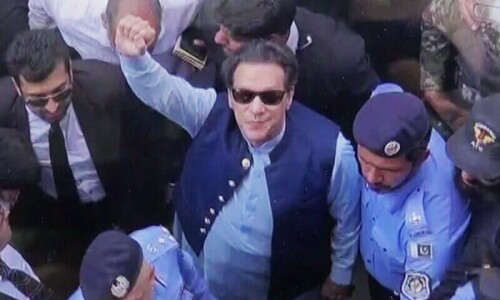YESTERDAY afternoon, Imran Khan and Shah Mahmood Qureshi stood acquitted of the charge of compromising state secrets.
‘Traitors’ for a grand total of about four months and one week, the two have been vindicated by the Islamabad High Court of charges brought against them in the infamous ‘cipher case’, as it came to be known.
While the detailed verdict is awaited, it is worth recalling that this was the most serious of the three convictions former prime minister Imran Khan had been slapped with in quick succession in the days leading up to the Feb 8 general election. Both Mr Khan and ex-foreign minister Mr Qureshi had been handed 10 years’ rigorous punishment each for, in the eyes of the presiding judge, ‘leaking’ a secret cable and thereby compromising the safety, integrity and credibility of Pakistan’s secure communication system with its diplomatic missions abroad.
The conviction had precluded Mr Qureshi’s right to participate in the general election; Mr Khan had already been deemed ineligible by an earlier conviction in the Toshakhana case.
The verdict had been secured on the state’s third attempt at prosecuting the case. Two earlier trials were aborted by the IHC after it found serious irregularities in the proceedings. Even then, the trial court’s sentence was almost immediately slammed by the legal community; many had criticised the abnormal circumstances in which the trial was completed. This was the same case, it may be recalled, in which the court had denied the two defendants their right to appoint their own counsels or cross-examine the prosecution’s witnesses, even though the prosecution had sought the maximum penalty of a death sentence.
Even then, the biggest charge the two were found guilty of — compromising the country’s secure diplomatic communication system — was undermined by the Foreign Office shortly after, when it affirmed through a statement that its communication system had been audited and found to be safe and protected. There was, therefore, near unanimity in the legal community that the verdict would be overturned: it was not a question of if but when.
In retrospect, Mr Khan and Mr Qureshi committed a historical blunder and caused an international diplomatic incident by using the cipher as a political prop; however, this was never reason enough to punish them under laws originally meant to prosecute traitors and foreign spies. That, as prime minister, Mr Khan chose to use sensitive diplomatic communications for selfish political reasons, imperilling diplomatic ties with the country’s largest trading partner, should have been left as something for voters to ponder.
Instead, our state, in its desperation to victimise another ex-prime minister, once again left them looking like more of a hero than they perhaps deserved to be. There are lessons aplenty in this saga: but will our state ever learn?
Published in Dawn, June 4th, 2024














































Dear visitor, the comments section is undergoing an overhaul and will return soon.